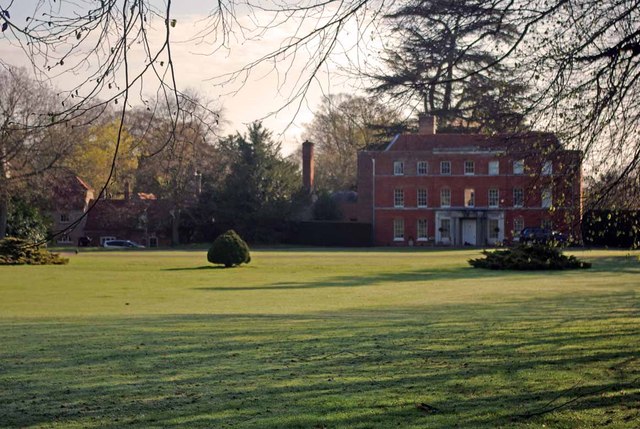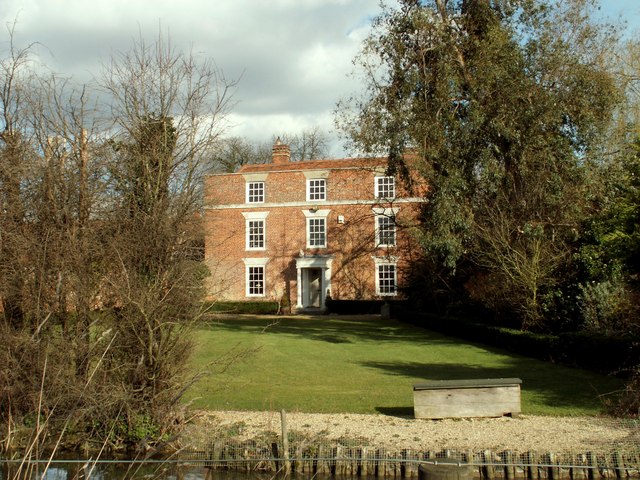|
Copford Hall
Copford Hall is a manorial seat and Grade II listed country house, with gardens by Capability Brown, in the village of Copford, Essex, England, 46 miles (74 km) from London. The building was at one time owned by the bishops of London, and its grounds are described in Pevsner as "almost the ''beau idéal'' of what to the foreigner is an English landscape scene". The present house is a large, square red-brick building with stone dressing and ornamentation, the façade the result of alterations in the early 1800s. However, the majority of the structure dates back to 1720, and parts of the inside to the early 1600s. The extensive grounds include canals, fishponds and water features. On the lowest pool is a classical boathouse. Part of the possessions of the bishopric See of London before the Norman conquest of England, it came into the possession of the Crown and was sold by King James I of England to the Mountjoy family. It was purchased from them by John Haynes in 1626, who l ... [...More Info...] [...Related Items...] OR: [Wikipedia] [Google] [Baidu] |
Fiske Goodeve Fiske-Harrison
Fiske Goodeve Fiske-Harrison (2 September 1793 – 1872) of Copford Hall, Lord of the Manor of Copford was High Sheriff of Essex. He was born Fyske Goodeve Harrison on 2 September 1793 at Copford Hall, Essex, to John Haynes Harrison. John Haynes Harrison had inherited the manor from his first cousin, Hezekiah Haynes, a Major General in the army of Oliver Cromwell. Hezekiah Haynes had inherited it from his father, John Haynes, who had purchased it from the Mountjoy family. However, John Haynes lived mainly in the Americas where he was the first Governor of the Massachusetts Bay Colony and later Connecticut. John Haynes Harrison married Sarah Thomas Fiske, only child and heiress of Reverend John Fiske of Thorpe Morieux, Suffolk. ''The Fiske Family Papers'', a history of the family, states that she was heiress to £18,000 on her marriage in 1789. Fiske-Harrison was educated at Charterhouse School, 1806-1810, and St John's College, Cambridge. He served in the East Essex Regular ... [...More Info...] [...Related Items...] OR: [Wikipedia] [Google] [Baidu] |
Copford Hall - Geograph
Copford is a village and civil parish in Essex, England, west of Colchester. The hamlet of Copford Green is found a short distance to the south. The poet Matthew Arnold noted he was struck by ''"the deeply rural character of the village and neighbourhood."'' History Copford was originally a manor held by the Bishop of London's office. Upon the death of Edmund Bonner in 1569 (also buried here) the land briefly became property of The Crown until 1609 when it returned to private ownership once more . The parish church of St Michael is renowned for its 12th-century Norman wall paintings that are among the best in England. The church door has been found to have human skin attached, possibly as a gruesome remnant of the ancient punishment meted out to those who invaded the sanctity of the church.Wall, J. Charles (1912), ''Porches and Fonts.'' Pub. Wells Gardner and Darton, London. P. 41 - 42. Adjacent to the church is the manorial house of Copford Hall. Governance Copford is part of ... [...More Info...] [...Related Items...] OR: [Wikipedia] [Google] [Baidu] |
Connecticut Colony
The ''Connecticut Colony'' or ''Colony of Connecticut'', originally known as the Connecticut River Colony or simply the River Colony, was an English colony in New England which later became Connecticut. It was organized on March 3, 1636 as a settlement for a Puritan congregation, and the English permanently gained control of the region in 1637 after struggles with the Dutch. The colony was later the scene of a bloody war between the colonists and Pequot Indians known as the Pequot War. Connecticut Colony played a significant role in the establishment of self-government in the New World with its refusal to surrender local authority to the Dominion of New England, an event known as the Charter Oak incident which occurred at Jeremy Adams' inn and tavern. Two other English settlements in the State of Connecticut were merged into the Colony of Connecticut: Saybrook Colony in 1644 and New Haven Colony in 1662. Leaders Thomas Hooker delivered a sermon to his congregation on May 31, ... [...More Info...] [...Related Items...] OR: [Wikipedia] [Google] [Baidu] |
Country Houses In Essex
A country is a distinct part of the world, such as a state, nation, or other political entity. It may be a sovereign state or make up one part of a larger state. For example, the country of Japan is an independent, sovereign state, while the country of Wales is a component of a multi-part sovereign state, the United Kingdom. A country may be a historically sovereign area (such as Korea), a currently sovereign territory with a unified government (such as Senegal), or a non-sovereign geographic region associated with certain distinct political, ethnic, or cultural characteristics (such as the Basque Country). The definition and usage of the word "country" is flexible and has changed over time. ''The Economist'' wrote in 2010 that "any attempt to find a clear definition of a country soon runs into a thicket of exceptions and anomalies." Most sovereign states, but not all countries, are members of the United Nations. The largest country by area is Russia, while the smallest is ... [...More Info...] [...Related Items...] OR: [Wikipedia] [Google] [Baidu] |
Maldon (UK Parliament Constituency)
Maldon is a constituency in Essex represented in the House of Commons of the UK Parliament since 2010 by Sir John Whittingdale, a Conservative. Constituency profile Maldon covers a rural area of Essex including the Dengie Peninsula. The main settlements are Maldon and Burnham-on-Crouch on the coast, and the new town of South Woodham Ferrers. The seat is slightly wealthier than the UK average. History The Parliamentary Borough of Maldon, which included the parish of Heybridge, had sent two members to Parliament since 1332 (36 years after the Model Parliament). Under the Reform Act of 1867, its representation was reduced to one and in 1885 the Parliamentary Borough was abolished and replaced with a Division of the County of Essex (later a County Constituency) under the Redistribution of Seats Act 1885. The constituency was abolished for the 1983 general election following the Third Periodic Review of Westminster Constituencies, but re-established for the 2010 general electi ... [...More Info...] [...Related Items...] OR: [Wikipedia] [Google] [Baidu] |
Member Of Parliament
A member of parliament (MP) is the representative in parliament of the people who live in their electoral district. In many countries with bicameral parliaments, this term refers only to members of the lower house since upper house members often have a different title. The terms congressman/congresswoman or deputy are equivalent terms used in other jurisdictions. The term parliamentarian is also sometimes used for members of parliament, but this may also be used to refer to unelected government officials with specific roles in a parliament and other expert advisers on parliamentary procedure such as the Senate Parliamentarian in the United States. The term is also used to the characteristic of performing the duties of a member of a legislature, for example: "The two party leaders often disagreed on issues, but both were excellent parliamentarians and cooperated to get many good things done." Members of parliament typically form parliamentary groups, sometimes called caucuse ... [...More Info...] [...Related Items...] OR: [Wikipedia] [Google] [Baidu] |
Lord Lieutenant
A lord-lieutenant ( ) is the British monarch's personal representative in each lieutenancy area of the United Kingdom. Historically, each lieutenant was responsible for organising the county's militia. In 1871, the lieutenant's responsibility over the local militia was removed. However, it was not until 1921 that they formally lost the right to call upon able-bodied men to fight when needed. Lord-lieutenant is now an honorary titular position usually awarded to a retired notable person in the county. Origins England and Wales Lieutenants were first appointed to a number of English counties by King Henry VIII in the 1540s, when the military functions of the sheriffs were handed over to them. Each lieutenant raised and was responsible for the efficiency of the local militia units of his county, and afterwards of the yeomanry and volunteers. He was commander of these forces, whose officers he appointed. These commissions were originally of temporary duration, and only when the ... [...More Info...] [...Related Items...] OR: [Wikipedia] [Google] [Baidu] |
Lord Of The Manor
Lord of the Manor is a title that, in Anglo-Saxon England, referred to the landholder of a rural estate. The lord enjoyed manorial rights (the rights to establish and occupy a residence, known as the manor house and demesne) as well as seignory, the right to grant or draw benefit from the estate. The title continues in modern England and Wales as a legally recognised form of property that can be held independently of its historical rights. It may belong entirely to one person or be a moiety shared with other people. A title similar to such a lordship is known in French as ''Sieur'' or , in German, (Kaleagasi) in Turkish, in Norwegian and Swedish, in Welsh, in Dutch, and or in Italian. Types Historically a lord of the manor could either be a tenant-in-chief if he held a capital manor directly from the Crown, or a mesne lord if he was the vassal of another lord. The origins of the lordship of manors arose in the Anglo-Saxon system of manorialism. Following the N ... [...More Info...] [...Related Items...] OR: [Wikipedia] [Google] [Baidu] |
Brian Harrison (Conservative Politician)
(Alastair) Brian Clarke Harrison (3 October 1921 – 21 August 2011) was a British Conservative politician. Harrison was born in 1921 in Melbourne, Australia. He was the son of the soldier and politician Eric Harrison. He was educated at Geelong Grammar School and during World War II served in the Australian Army from 1940 and as a volunteer with the Australian Independent Companies (Commandos) in Halmahera and Borneo. After the war he was at Trinity College, Cambridge. He rowed for Cambridge in the record-breaking crew in the 1948 Boat Race. Most of the crew rowed for Great Britain in the 1948 Summer Olympics; Harrison did not participate in the Games as Australia did not enter a squad. Harrison returned to Australia from 1950 to 1951 and studied immigration and development. As a descendant of Fiske Goodeve Fiske-Harrison he inherited Copford Hall, and became Lord of the manor of Copford in Essex where he then settled to become a farmer and estate manager. ... [...More Info...] [...Related Items...] OR: [Wikipedia] [Google] [Baidu] |



